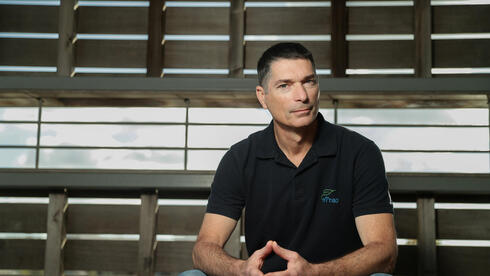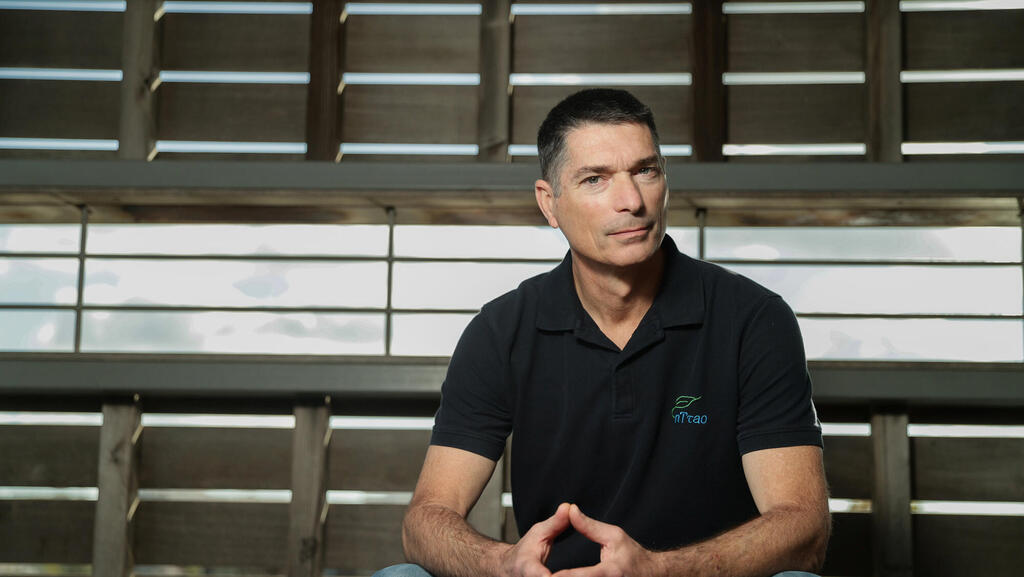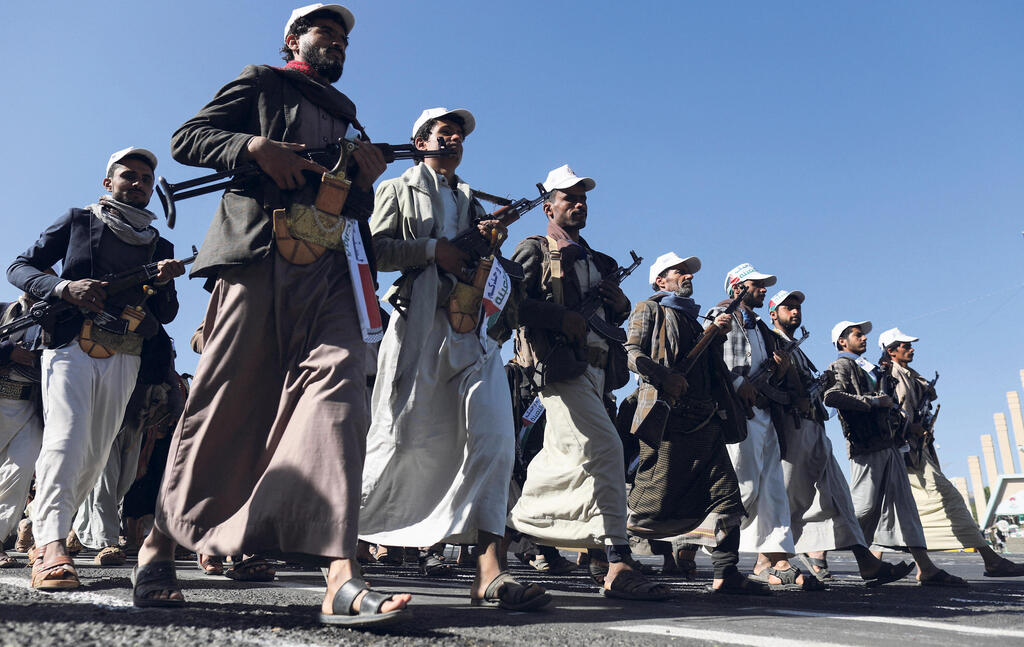
Interview
"The turning point in the fight against Houthi terrorism came when they attacked the energy sector"
Oded Gour-Lavie, CEO of the start-up NT-Tao and a former senior officer in Israel’s Navy, believes that the real solution to the Houthi threat is to go on the offensive. He also speaks of Israel's need to develop technology for the production of green energy, despite the large gas reserves discovered off its coast
The Houthis, a Yemeni Shia-Zaydi terrorist organization that belongs to the Iranian "Axis of Resistance", burst into our lives two months ago almost as a curiosity, an arena that was perceived as marginal compared to Hamas and Hezbollah. Until recently they were mainly the problem of Saudi Arabia, because they see Sunni Muslim organizations as enemies. However, as the days go by, it becomes clear that the front with the Houthis may become a tie-breaker in the war. It has resulted in the establishment of an international force that operates in the Red Sea to protect the vessels that pass through it, after several shipping giants announced in the last two weeks that they will stop sailing through the Suez Canal.
This happened after the Houthis attacked and took over a number of ships in the Red Sea last month in order to harm Israeli trade. Still, the international force was only established a couple of weeks ago - almost a month later. What does the timing mean? If you ask Rear Admiral Oded Gour-Lavie, former commander of the Israeli Submarine Fleet and the Israeli Sea Division and an entrepreneur in the field of nuclear fusion, the real drama lies in one important number: about 20% of the world's oil and gas consumption passes through the Bab el-Mandeb Strait, which separates Asia from Africa.
“The big and main turning point didn't happen when some containers didn't pass through the canal, but when they started attacking energy targets," Gour-Lavie, currently CEO and co-founder of the startup NT-Tao which deals in the field of green energy, told Calcalist. "Energy is the main generator of the world economy, and whether they did it on purpose or not, the Houthis made oil companies like BP and others come to the decision to not pass through the Red Sea. This - in addition to the fact that even in Europe they are already feeling like we do in Israel that containers from China aren’t arriving on time - is going to hurt the internal economies, because if there is no energy then there is no way to activate the internal economy. And with the shortage that already exists from Russia and the reliance on other sources, including Qatar, this creates pressure and forces countries to get involved because when it comes to energy, we are getting to a point of no return."
This is especially true now, after two years in which the Europeans are paying double and triple for their electricity in light of the sanctions imposed on Russia.
"These are joint moves, and Iran and Russia are coordinated in some of these things. These are moves that are connected to the world of energy, which is beginning to be a key element not only in the naval strategies of countries and superpowers like the United States, but has an influence on regional moves, and geo-strategy.”
How do you think the Houthi threat will develop? What will the international force do to remove it?
"On the defense side, we have somewhat returned to the days of World War II, when ships were escorted across oceans to protect them from attacks. But defensive action, as has been proven time and time again throughout human history, will always be breached. Therefore, the only way to remove a threat in the end is to go on the offensive. We have no choice. At the same time, we need to create coalitions and forces that will remove the interests for using this terrorism, and these are longer-term moves."
Is your intention to attack the Houthis in Yemen or to attack Iran that sends them?
"It is difficult to estimate, but just as we are hitting Hamas with force, so that Hezbollah at this stage understands the situation, the same can be done with the Houthis and Iran. As a first step, I assume that the right move would be to remove the local threat. It would need to start from there because that is where the threat is located and to act directly against Iran, besides the fact that I am not sure that this is the right thing to do, is already a decision for a superpower, and I do not think that there is currently a global willingness, because this event is a broader move that involves Russia and China, who support Iran. Therefore, I do not see a situation in which Israel directly attacks Iran, unless it carries out another attack or ill-considered action. On the other hand, I was surprised when last Saturday the Iranians attacked an Israeli ship carrying crude oil using a UAV. I didn't really expect that."
Could this be the moment Israel attacks Iran?
"Iran has a lot of remote attack capabilities, and it is dangerous, but I am more worried about Hezbollah than Iran from afar. As for the question of whether Israel will launch a preemptive strike, a preventative strike - I think Biden quickly torpedoed such a move. The American activity and the involvement of Centcom, the United States Central Command that is one of the eleven unified combatant commands of the U.S. Department of Defense, which is here in the region, are designed, among other things, to prevent us from acting. To remind you, even in the first Gulf War we wanted to act strongly and they told us to wait, calm down, and as a result there were more attacks."
Gour-Lavie, 56, knows the maritime arena well. He was released from the IDF with the rank of Rear Admiral in 2016, upon completion of his last position as Head of Legal & Strategic Policy in the IDF Planning Directorate following Operation Protective Edge. Prior to that, he served as the commander of the Israeli Submarine Fleet and the Israeli Sea Division, and as part of this role, in April 2014, he commanded from the underground command center in the Kiyra military compound the daring takeover operation of the Iranian missile ship near the Eritrea-Sudan border.
"We have been delaying this event for 15 years," he says of the current war. "My perspective is not in regards to the last two and a half months, but from 2006. What Hamas has been doing since, what we are doing against Hamas, what we said we would do and didn't do. This necessary move of entering Gaza and eliminating this threat must not be stopped and must be fully completed."
When you say ‘what we said we’d do and didn't do’. What do you mean?
"We said that we were defining an area near the fence that must not be accessed and that anyone who approached the fence after the rise of Hamas would be hit, and that we would respond aggressively to any intrusion, any shooting, and yet we were concerned with containment. In addition, we built a fantastic defense system, the Iron Dome, and this gave the decision makers a cushion for action, it means that there are fewer deaths in Gaza because we don't have to react so strongly, it means that there are fewer deaths here, which is wonderful, and in general it allows for containment, but it does not bring a solution. This method of engaging in containment and an approach where we only react and do not carry out preemptive action leads to a more difficult situation, and when there is no choice, then we act, and act hard. The IDF is operating amazingly now, despite all the painful losses."
Gour-Lavie, who graduated with a bachelor's degree in electrical engineering from the Technion and a master's degree in government and public administration from Harvard, turned to entrepreneurship upon his release from the IDF. He founded NT-Tao with the physicist Doron Weinfeld and Weinfeld's brother Boaz in early 2019, after three years of preliminary work.
NT-Tao, a name that represents the three parameters of the plasma (N = Density, T = Temperature and Tao = the time they last, "This is a formula in fusion, and these are the three parameters that are used to reach the conditions in which it is implemented,” says Gour-Lavie. The company is located in Hod Hasharon and currently employs 24 people, some of whom are currently serving in the IDF reserves.
"We work with a method of magnetic confinement", he explains, "which is to confine the plasmas within special, relatively strong fields, and give them heating in the process, and by this reach the conditions and temperatures that are required." In February of this year, the company raised $22 million, which later increased to $28 million. Among the investors in the company are Honda, Delek USA, Next Gear Ventures and VC fund OurCrowd.
Nuclear fusion, the process by which atomic nuclei fuse into a larger nucleus, which occurs in stars and hydrogen bombs, is the holy grail of the energy world. For about 80 years, scientists have been trying to imitate the "mystery of the sun" and reach a breakthrough that would allow the production of electricity using modern nuclear reactors, which reproduce on Earth a process that takes place outside the Earth. This will enable the production of green energy, which will eliminate dependence on gas and oil, and alleviate the effects of the climate crisis. But to date, most of the experiments done in the field have not been successful.
One experiment that was successful in December of last year at the Lawrence Livermore National Laboratory in California is causing a lot of enthusiasm, even though the method used - lasers - is not effective in terms of the percentage of energy transfer. "The speed of the lasers is such that it is not possible to build a device that produces energy continuously," he explains. "But they proved something very important and it's a breakthrough - they showed it is something that's possible here on Earth. Now the trick is to come up with a few more engineering improvements."
Israel, he says, thanks to gas, does not have an energy problem, "unless Hezbollah attacks and knocks down some rig, then we will be in trouble. This is a sensitive situation. Israel's rigs and energy sources do not have redundancy, they are not really distributed enough. There are rigs in the sea and they may be attacked and then you have no gas supply and you have no energy. At the moment Israel is in an overall good situation in the face of the environmental crises - we have water, because we desalinate water, and we have gas."
And at the same time you recognize a need for energy redundancy.
"The issue of energy surplus and source surplus is very critical. When superpowers buy oil they don't buy from one source, they buy from many sources and create a surplus for themselves, but in the end it is oil and gas that pollute. The issue of energy surplus and source surplus is super critical. But Israel, at the moment that it discovered the gas, shifted its focus, because suddenly there are other economic interests - both to sell gas, and for Israel to use this gas, and there are all sorts of elements here. But on a global level, until there is a significant decentralized and redundant alternative source of energy, which will eliminate the need to use oil, we are still captives of the Gulf states to a large extent."
Why do you think that you will succeed where no one else has succeeded?
"Israel succeeds in achieving technological breakthroughs like no other country in many aspects. I think one of the reasons is the creativity and the thinking outside of the box that we have in Israel. The ideas in my laboratory are unique, the combinations of what we do is based on history and the successes that existed in the past but were not completed, and we take them today and add inventiveness into these technologies.
"I know that we are unique with some of our inventions without a doubt, and also with our simulations. Also in the collaborations and thinking that we have with Princeton and also a little with MIT. We see that we have something that is different. We have a very strong Israeli team, which is not afraid to conduct many experiments and trials. We are not waiting for some amazing result in the simulation, but running fast, this is the world of startups. The big transition of nuclear fusion arrived in the last decade with the transition from academic processes of national and multinational academic laboratories to startups that run at a much faster pace and are product-focused and this is a big essential difference. Until it is proven otherwise and until we prove to ourselves that we were wrong, we will keep trying."
















